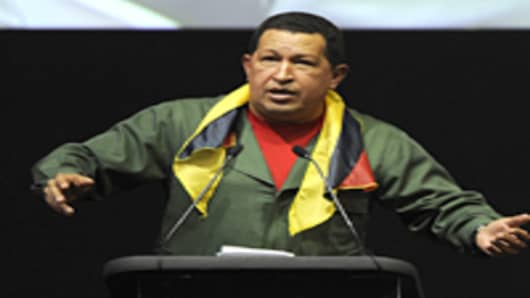Venezuelan President Hugo Chavez's appearance at independence day celebrations on July 5 has calmed speculation that a change of government is imminent in the country, but it has highlighted the extent of his personal control in the world's eighth-largest oil exporter, analysts told CNBC.com.
Speculation over Chavez's health had been escalating since he left for Cuba, undergoing emergency surgery for an abscess in his pelvis. The surgery, and the absence that followed – from June 10 until his appearance on television on June 30 – was uncharacteristically long and silent.
The president makes routine appearances in the Venezuelan media, even hosting a regular TV show, Alo Presidente.
On his June 30 appearance, a pale Chavez admitted being treated for cancer in Cuba. He made a brief speech on July 5, but did not preside over the independence ceremonies.
Chavez's absence demonstrated the concentration of power in Venezuela, and the extent to which the president himself is central to the functioning of the country's government. Chavez, the caudillo – strongman – at the heart of the government, has purged potential opponents from office, analysts told CNBC.com.
Over the years of his rule, even technocrats have been pushed out of the political system in favor of apparatchiks across many of the key ministries and state-owned enterprises.
When, in June, while Chavez was in Cuba, rioting in the El Rodeo prison near Caracas saw inmates take over the facility – a relatively frequent occurrence in Venezuela's troubled prison system – the bungled response was illustrative of how little bench strength the Venezuelan government has, Joel Hirst, a Venezuela expert at the Council on Foreign Relations, said.
"Without Chavez's nanomanagement, the interior minister launched a full-scale assault on the prison using 5,000 security personnel. They teargassed family members, they teargassed the press. They evacuated the prisoners who were not taking part in the revolt in this weird process of putting them into metro buses," Hirst said.
"What was odd was the fact that even something as usual and ordinary as this, without Chavez's micromanagement, got completely out of control."
It was not even clear just who was at the helm while Chavez was out of the country, according to Hirst.
"Chavez, technically, should have handed over executive power when he went under general anaesthesia, like in any country in the world. He should have officially handed over the reins to the VP, and he also technically can't govern from a foreign country… Elias Jaua, the VP, has been very vocal saying that he has no role in leadership, he did not make decisions," Hirst said.
"There's nothing there, there's no institutionality - there's just the man… Any time something happens like this, they are too afraid to take decisions, because they're afraid that it will look like they're taking too much power. And at the same time, they probably don't know what to do. He's got a whole bunch of people there who aren't qualified for the job. They really don't know what to do."
Chavez's socialist government and anti-capitalist rhetoric remain popular with large numbers of his people. However, the nationalization of industries and his propensity for removing competent people from key industries, based on their perceived threat to the regime. The national oil company PDVSA is one example – according to Stratfor analyst Peter Zeihan, purges of top staff have left the monopoly operating well below capacity for years.
Perhaps unsurprisingly, markets reacted favorably to suggestions that Chavez's government might be about to fall, even if that was wishful thinking, according to Stuart Culverhouse, chief economist at frontier markets boutique Exotix.
"The market reaction has been pretty euphoric, but I never thought it would lead to any change. We've got an election next year, and unless his health takes a turn for the worse and prompts a reshuffle at the top, I think markets were a bit optimistic," Culverhouse told CNBC.com.
"Depending on his health, if he can continue as the president and also be visible, then I don't think really much changes. All eyes will be on next year, and maybe this has an impact at the margin about what the election result might be, but I think he still stands a very good chance of winning next year, and he will ensure that the fiscal pumps are primed to that purpose."
However, should Chavez remain in power but weakened, already heterodox centralized policymaking could become yet more so.
"If he is there, but somehow not able to take more of a role, then this really highlights the key man risk," Culverhouse said. "Policymaking is already pretty erratic, but it's going in a direction that you kind of know. If he is not able to take decisions, other people will probably feel that they can't take decisions, and I think you end up in a worse situation, for more unpredictable policies."
Many of the risks of dealing with Venezuelan assets are priced in and understood, Culverhouse noted.
"People know that there is high inflation, they know that there is massive capital flight, they know that the expropriation has crept into other industries, and they know the centralization of policymaking. I think probably the risk is that the fiscal situation gets worse ahead of the election because of the need to get him re-elected."
A more significant tail risk, Culverhouse said, would be a sustained period of reduced oil prices.
"The policymaking is not ideal, but from a creditor perspective, bondholders are getting paid. I think that might change if oil prices are lower, but they would have to be low for a long period of time," he said. "If that turned out any longer then the house of cards that is economic policy would come rapidly crashing down."


